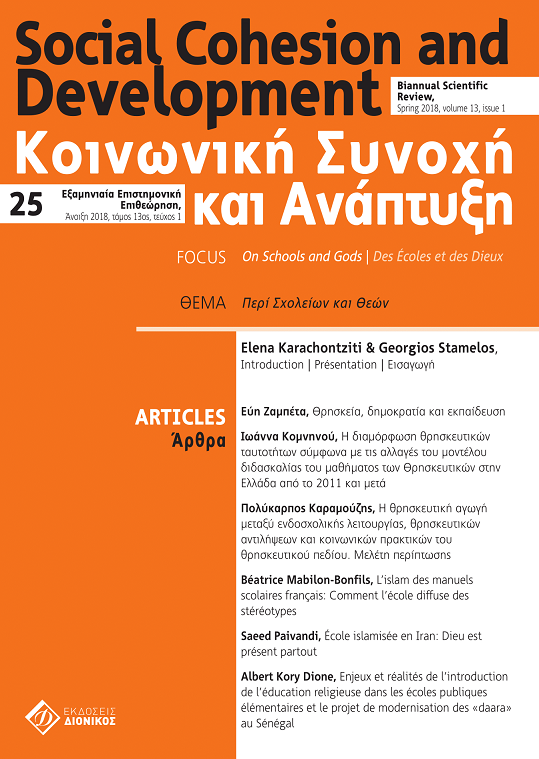Religious education between inter - school function, religious perceptions and social practices of the religious field: A case study

Published:
Mar 18, 2019
Keywords:
Religious Education Religious Field Society Religiosity Interreligious Education Secularization
Abstract
The social and political characteristics of religion influence the lesson of Religious Education in modern school and the functioning of the Religious Field, the conflicts within it and the efforts to control its content. However, in a pluralistic society, how important is the presence of a lesson of interreligious education on terms and criteria of school learning rather than religious inclusion? Can the school bring religion back into the public debate with the conditions of the functioning of a secular society, or the restoration of religion will be a return to the pre-modern situation? In this direction we considered it appropriate to investigate the perceptions of 540 students, mainly from the Theological and the Pedagogical Faculties, about the content of the lesson, their religious perceptions and the Greek society.
Article Details
- How to Cite
-
Καραμούζης Π. (2019). Religious education between inter - school function, religious perceptions and social practices of the religious field: A case study. Social Cohesion and Development, 13(1), 47–58. https://doi.org/10.12681/scad.19875
- Section
- Articles

This work is licensed under a Creative Commons Attribution-NonCommercial-ShareAlike 4.0 International License.
Authors who publish with this journal agree to the following terms:
- Authors retain copyright and grant the journal right of first publication with the work simultaneously licensed under a Creative Commons Attribution Non-Commercial License that allows others to share the work with an acknowledgement of the work's authorship and initial publication in this journal.
- Authors are able to enter into separate, additional contractual arrangements for the non-exclusive distribution of the journal's published version of the work (e.g. post it to an institutional repository or publish it in a book), with an acknowledgement of its initial publication in this journal.
- Authors are permitted and encouraged to post their work online (preferably in institutional repositories or on their website) prior to and during the submission process, as it can lead to productive exchanges, as well as earlier and greater citation of published work (See The Effect of Open Access).
Downloads
Download data is not yet available.
References
Davie, G.(2010). Κοινωνιολογία της Θρησκείας. Αθήνα: Κριτική.
Dianteill, E. (2003). Pierre Bourdieu and the Sociology of Religion: A Central and Peripheral Concern. Theory and Society 32(5): 529-549.
Durkheim, E. (1995). The Elementary Forms of Religious Life. New York: Free Press.
Gearon, L. (2012). European religious education and European civil religion. British Journal of Educational Studies 60(2): 151–69.
Karamouzis, P. (2015). Religious Capital in relation to teacher’s views on RE. A comparative study in the Greek educational context. British Journal of Religious Education, Routledge. vol. 37.
Καραμούζης, Π. (2013). Ερμηνευτικά Μοντέλα Θρησκευτικότητας. Προς μια κατανοητική λειτουργία της θρησκείας. Στο Γ. Κόκκινος – Μ. Χιονίδου. (Επιμ.) Επιστήμες της Εκπαίδευσης. Από την ασθενή ταξινόμηση της Παιδαγωγικής στη διεπιστημονικότητα και στον επιστημονικό υβριδισμό. Π.Τ.Δ.Ε. Πανεπιστημίου Αιγαίου. Αθήνα:Ταξιδευτής, σσ. 81-98.
Καραμούζης, Π. (2012). Πολιτισμός και Διαθρησκειακή Αγωγή. Η συγκριτική διδακτική των θρησκειών και της θρησκευτικότητας στο σύγχρονο σχολείο. Θεσσαλονίκη: Επίκεντρο.
Καραμούζης Π., Αθανασιάδης Η. (2011). Θρησκεία, Εκπαίδευση, Μετανεωτερικότητα. Η Θρησκευτική Αγωγή στο Σύγχρονο Σχολείο. Αθήνα: Κριτική.
Καραμούζης, Π. (2009). Η θρησκευτική εκπαίδευση ως πολιτικά διαμεσολαβημένη διαδικασία κοινωνικής ενσωμάτωσης. Το Βήμα των Κοινωνικών Επιστημών, Πανεπιστήμιο Θεσσαλίας, Βόλος, σσ. 319-340.
Koulianidi, G. & Stefos, E. (2015). Consequences of Dietary Habits and Endocrine Disruptors in School Performance of Children Aged 10-12 in Greece. American Journal of Food Science and Nutrition. vol. 2, no. 6, 2015, pp. 113-120.
Schultheis, F. (2008). Salvation Goods and Domination: Pierre Bourdieu’s Sociology of the Religious Field. In J. Stolz, (dir). Salvation Goods and Religious Markets: Theory and Applications. Berne: Peter Lang.
Stefos, E., Benalcázar Jiménez, M. E., Coral Carvajal, M. M.,Córdova Vargas, P. A., Landázuri Muñoz, M. B., Lombeida Saltos, E. S., Mejía Villafuerte, D. A., Vasquez Muñoz, C. L. & Yajamín Villamarín, R. X., (2016),“A Data Analysis of Social and Educational Characteristics of Ecuadorians Aged 25–64”. AASCIT Communications, 3(3).
Stefos, E. (2015). «Análisis Factorial. Su Aplicaciónen la Investigación Científica. CicloInternacional de Conferencias de DivulgaciónCientífica», PUCE, 2015.
Stolz, J., (2008), Salvation Goods and Religious Markets: Theory and Applications. Berne: Peter Lang.
Vallejo, A., Stefos, E. & Narváez, A. (2018). Service Quality Analysis of Universities in Cuenca, Ecuador. International Journal for Quality Research, 12(1) 3-16.
Weber, M. (2007). Θρησκεία και Οικονομία, Κοινωνιολογία της Θρησκείας: Θρησκευτικές Κοινότητες. Αθήνα:Σαββάλας.
Weisse, W. (2010). REDCo: A European Research Project on Religion in Education. Religion & Education, 37:3, 187-202.


